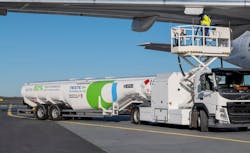The clearer skies across many urban centers due to COVID-19 was a wake-up call, clearly showing the impact our actions have on air pollution and our climate.
This has invigorated the dialogue on climate change and environmental justice in the United States, with businesses and governments looking for ways to meaningfully cut emissions and pollution fast. This is especially true for aviation.
The commercial global aviation industry accounts for approximately 3 percent of global greenhouse gas emissions. This number is set to grow. The U.S. Federal Aviation Administration (FAA) forecasts an increase in U.S. airline passengers from 917 million in 2019 to 1.31 billion by 2039—a 43 percent increase over a 20-year period.
More people flying on more planes means more fuel burned and more emissions if we continue business as usual. This poses a challenge. How can airlines keep these people flying with less emissions?
The best option is to power aircraft with a low emission, renewable fuel. The good news is that such a solution exists. Sustainable aviation fuel is available with supply set to increase in the years ahead.
Drawing Inspiration from Past Success
The aviation industry is facing a “fork in the sky,” and much like Neste, it has the chance to be on the right side of history by contributing to a sustainable future.
About 15 years ago, Neste decided to change its course and transform from an oil company to a renewable and circular solutions company. The main driver of this was to help create a healthier planet for future generations.
As part of this journey, Neste has been supporting the production of sustainable aviation fuel (SAF) for nearly a decade. Currently, Neste is a leading producer of renewable diesel and SAF. In 2011, Neste completed its first test flight powered by sustainable aviation fuel. The company has moved quickly since then, supplying SAF to U.S. airlines.
When Neste began this journey, climate change was just an inconvenient truth in much of the U.S., with limited demand from customers for renewable fuels and no policy frameworks in place to support renewable fuels.
Since then, more and more customers are demanding low emission, renewable fuels and governments are progressing policies to encourage and incentivize the use of renewable fuels instead of fossil fuels.
Solutions to Address the Problems of Today
Across the board, airlines recognize sustainable aviation fuels as one of the key elements to achieve their climate goals.
Sustainable aviation fuel, broadly, refers to jet fuel that is produced from renewable feedstocks instead of crude oil. There are a variety of possible feedstocks for sustainable aviation fuel, including used cooking oil, tallow, energy crops, agricultural and forestry residues and municipal solid waste.
The Neste MY Sustainable Aviation Fuel available in North America, for example, is made primarily from waste and residue materials such as used cooking oil. In fact, Neste is collecting and turning used cooking oil from concessionaires at airports, like Dallas Fort Worth and Chicago O’Hare, into renewable fuels. This creates a circular economy, where the waste from airports can help power aircraft.
Sustainable aviation fuel is a “drop-in” fuel, which means that it works seamlessly with existing aircraft engines, fueling systems and infrastructure.
Because of this, sustainable aviation fuel can immediately reduce direct greenhouse gas emissions and pollution from aircraft. Neste MY Sustainable Aviation fuel, for example, has the potential to reduce emissions by up to 80 percent compared to fossil jet fuel on a lifecycle basis.
Besides offering lower lifecycle carbon emissions, SAF usage lowers direct emissions of air pollutants, such as sulfur and particulate matter, for ground handling support and supports regional economic development through locally sited circular economic supply chain elements.
Currently, regulations require that sustainable aviation fuel is blended with fossil jet fuel, up to a 50-50 ratio. The blending ratio will ultimately determine the actual emissions reductions realized. Once blended, the fuel meets ASTM specifications.
The blending requirement ensures that sustainable aviation fuel works safely with older aircraft engines. However, the aviation industry is researching how sustainable aviation fuel can be used in its pure form to power aircraft in the future.
Importantly, the sustainable aviation fuel industry is making it easier for customers to access the fuel.
Last year, Neste began supplying sustainable aviation fuel to San Francisco International Airport, with American Airlines, Alaska Airlines, DHL and JetBlue committing to using the fuel. Additionally, Signature Flight Support has supplied more than 1 million gallons of Neste MY Sustainable Aviation Fuel to its FBO at the San Francisco International Airport.
Globally, more than 40 airlines now have sustainable aviation fuel experience, with an estimated 200,000 commercial flights using SAF since 2011 and 1.6 billion gallons of SAF committed to forward purchase agreements.
The Future is Sustainable
Neste sees significant growth potential for renewable fuels in the aviation market. Demand is there – from airlines, business aviation, and end customers.
That is why Neste has invested to achieve 515 million gallons of sustainable aviation fuel production capacity by 2023, 15-times more than its current production capacity.
The company has also entered into strategic partnerships to increase the availability of sustainable aviation fuel in the US. For business aviation, Neste is partnering with Avfuel and Signature Flight Support to make Neste MY Sustainable Aviation Fuel to business aviation.
The future of air travel is clear: It will pick back up, be sustainable and increasingly run on SAF. Air travel allows us to have a globalized economy, connect with nature and experience diverse destinations, so it's critical we work together to get more planes running on SAF instead of fossil jet fuel.
Air travel plays an important role in our economy and lives, connecting people and cultures as well as supporting global supply chains. As more people become vaccinated and engines begin to roar, and planes begin to take off again, today is the time to truly invest in the adoption of SAF to finally spread its wings.
Pratik Chandhoke is the technical services manager for Sustainable Aviation Fuel (SAF) at Neste, the world's largest producer of renewable diesel and SAF. Chandhoke's responsibilities include technical management and customer support for use of Neste MY Sustainable Aviation Fuel in North America. Prior to joining Neste in 2017, he worked for 10 years at Rolls Royce in various roles. Chandhoke holds an MBA and Bachelors in Mechanical Engineering from Purdue University.
About the Author

Pratik Chandhoke
Pratik Chandhoke is the technical services manager for Sustainable Aviation Fuel (SAF) at Neste, the world's largest producer of renewable diesel and SAF. Chandhoke's responsibilities include technical management and customer support for use of Neste MY Sustainable Aviation Fuel in North America. Prior to joining Neste in 2017, he worked for 10 years at Rolls Royce in various roles including product, project management and engineering across various groups. His primary projects focused on fuel control systems development for R-R AE series engines for military, civil, and marine applications. Chandhoke holds an MBA and Bachelors in Mechanical Engineering from Purdue University.
